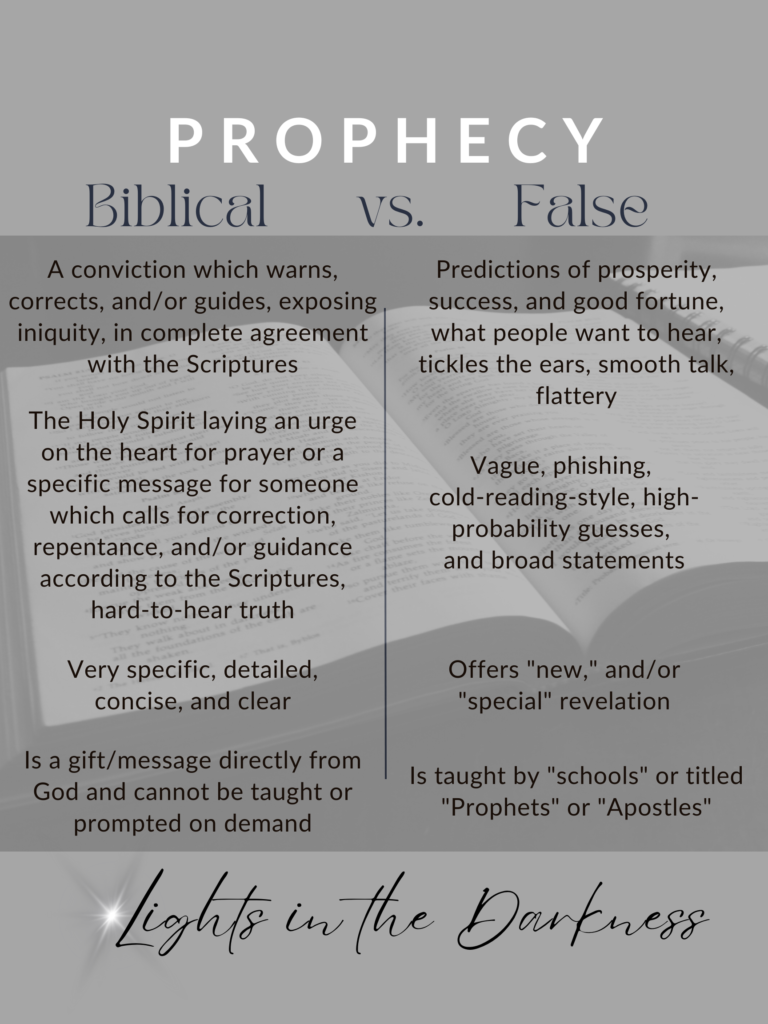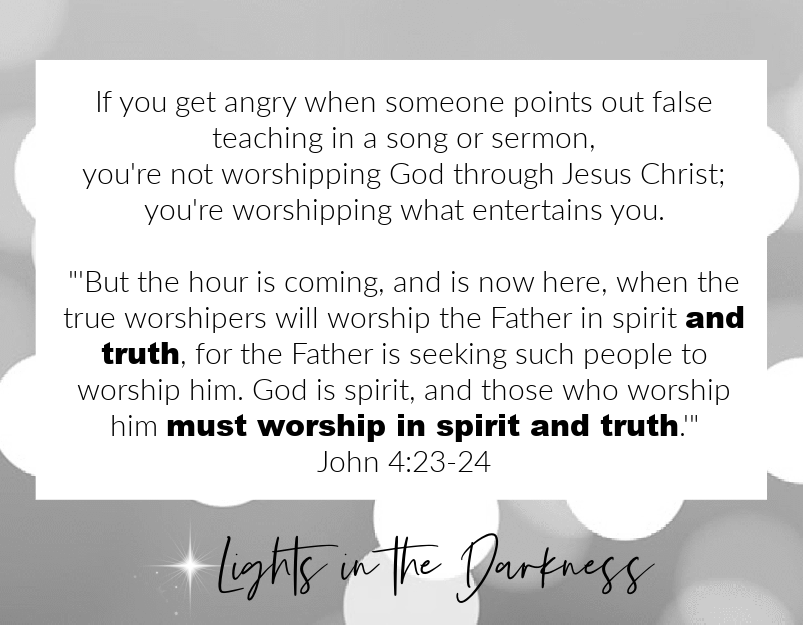
Once again, I come to you as a sister in Christ with reprove, rebuke, and exhortation in complete patience and teaching through love (2 Timothy 4:2).
I’ve been studying the topic of miracles over the past several weeks. In the midst of this study, I happened to be in a local business when I heard the lyrics of “Too Good Not to Believe” by Brandon Lake and Cody Carnes (Bethel and Elevation at work). First, let me say, I praise God for wisdom and discernment, y’all. The song emphasizes miracles happening today, as the singers say they’ve personally seen these miracles—they go on to list things such as cancer disappearing, salvation flooding the streets, and real-life resurrections. It’s like they’re everyday occurrences.
If you’re not feeling a little uncomfortable hearing some of these, that’s a red flag, friends. I ask that you stop and pray for the same wisdom and discernment and that truth be revealed to you.
They mention that while they cannot resurrect a man with their hands alone, if they just mention Jesus’ name, they can raise the dead (paraphrased). This is obviously present tense (not what Jesus has done in the past), being that the overall tone is set for the present, and they follow this lyric with “All the glory to the only One who can.” Not “did” (as seen with Lazarus in Scripture) or “will” (as in the future at the second coming [“…and the dead in Christ will rise” 1 Thessalonians 4:16]).
Before I go further, I want to clarify praying in Jesus’ name. As I’ve read recently, “Jesus is [our] Master. Not [our] mascot” (Melissa Dougherty). What this means is that “’In Jesus Name’ is not the same as “Abracadabra’” (Melissa Dougherty). Many often regard mentioning Jesus’ name in prayer as equivalent to some magic word that brings power to give you whatever you ask for (as seen in the Word of Faith movement). It’s a misinterpretation of verses such as John 14:13. To further, and best, explain prayer in Jesus’ name, this lesson is a must watch:
Of course, if you’ve read any of my material, you know there are many “churches” who focus on hypercharismatic, false teaching, and I’ve warned many times against them (Bethel being just one). So, with this in mind, here’s what I learned:
Dr. Frank Turek (Professor of Christian Apologetics and Christian apologetics author) had this to say in response to a question concerning miracles on Cross Examined:
Question: When Jesus shows up, miracles are happening like crazy. I mean, pre that it’s kind of a rare occurrence, and then we have His disciples, miracles are happening like crazy, prophetic, and in all of these healings, Peter’s walking down the street, and people are getting healed by his shadow. Why is that not happening today?
Answer: …How many miracles are there in the Bible? There’s about 250 (he’s estimating based on how some are bundled together, multiple going on at once, and whatnot, but using the round number). Let’s take it from Abraham to Jesus. That’s about 2000 years. If you have 250 miracles spread over 2000 years, how often do you get a miracle? You get one miracle every eight years. So, when we’re reading the Bible, we think miracles are happening all the time. They’re not. But do they happen [in eight-year increments]? No. Where do they happen? In the Bible miracles occur in three basic periods. Where God is doing miracles through people is Moses, Elijah and Elisha, and Jesus and the Apostles. Why? Because these people have new revelation that needs new confirmation. …There are periods in the Bible where there’s hundreds of years there are no miracles, because there’s no new revelation that needs new confirmation. That’s the main purpose of a miracle in the Bible—new revelation needs new confirmation. We’re not getting new revelation today that we’re adding to our Bible, so we don’t need people that have the gift of those miracles and do those things. Now, I think miracles do occur today, but I think God does it when He wants to in certain areas for certain reasons. But He’s not confirming new apostles, He’s not confirming new revelation, and that’s why we don’t see that same kind of thing happening like they did in those periods. If those things happened all the time, what would be the uniqueness of Moses, Elijah and Elisha, and Jesus and the Apostles? They wouldn’t be.
GotQuestions.org also has this to say:
While their beliefs and views are not 100% my own, and some stand in contrast to true biblical doctrine, they have some helpful commentary and information [meat and bones]:
The purpose of miracles was to authenticate the performer of the miracles. Acts 2:22 declares, ‘Men of Israel, listen to this: Jesus of Nazareth was a man accredited by God to you by miracles, wonders and signs, which God did among you through him, as you yourselves know.’ The same is said of the apostles, ‘The things that mark an apostle—signs, wonders and miracles—were done among you with great perseverance’ (2 Corinthians 12:12). Speaking of the gospel, Hebrews 2:4 proclaims, ‘God also testified to it by signs, wonders and various miracles, and gifts of the Holy Spirit distributed according to His will.’ We now have the truth of Jesus recorded in Scripture. We now have the writings of the apostles recorded in Scripture. Jesus and His apostles, as recorded in Scripture, are the cornerstone and foundation of our faith (Ephesians 2:20). In this sense, miracles are no longer necessary, as the message of Jesus and His apostles has already been attested to and accurately recorded in the Scriptures. Yes, God still performs miracles*. At the same time, we should not necessarily expect miracles to occur today just as they did in Bible times.
*Got Questions also defines a miracle as “a divine work of God that transcends human understanding and inspires wonder, displays the greatness of God, and causes people to recognize that God is active in the world.” Therefore, we may be able to safely say life itself and salvation are examples of how God still performs miracles today. Because, yes, God can and still does perform miracles on His own terms, by HIS WILL. Not at our demand or by our will.
Like mentioned in my last entry Emotional, many people can get caught up in emotionalism, desiring some sort of physical manifestation of God’s presence—maybe to confirm the belief or to satiate that feeling of the emotional high. Therefore, many search out miracles, signs, and wonders to satisfy that desire, even though they are experiencing falsehood. They are typically hypercharismatic and see the gifts of the Holy Spirit as something to manifest regularly today, taking it to the extreme even.
Now, I don’t consider myself a full-on cessationist1 (I wouldn’t say I’m cessationist or continuationist, really). We have to understand the Holy Spirit gives three different forms of power—ministering power (gifts/talents), miraculous power (tongues/healing), and moral power (sanctification/the power to live in obedience to God in holiness)—as summed up in the book Spirits: Holy and Unholy by Jack Cottrell (53). While miraculous power has ceased, because there’s no new revelation which needs confirmation (everything was fulfilled in Scripture and will remain until Jesus’ return), we know that moral power continues today, and I fully believe that we have ministering power—gifts/talents nurtured by the Spirit which we can and should use to glorify and honor God through Christ, helping spread the Gospel and working towards fostering His church. However, people abuse and confuse these gifts and mistranslate Scripture which details them. For instance, the gift of prophecy today is often taken to mean foretelling events of the future or mystical experiences like dreams and “receiving a word” which brings good fortune. But this is wrongful interpretation in reference to the gift today (and even false prophecy which is highly condemned in Scripture). Prophecy—as seen in Scripture such as Romans 12 and 1 Corinthians (multiple)—in Greek is prophēteia, meaning “the endowment and speech of the Christian teachers” (Blue Letter Bible). It means speaking the Word of God (the Bible) via preaching and teaching or a conviction of the Holy Spirit which is in complete agreement with Scripture (like praying for someone or warning a Christian sister of a sinful area in her life). Some people—like I feel in my calling—have a strong knack for teaching. They have a strong desire to help others understand. Others have different or many fortes, like leading, giving, and serving.

Something I learned recently, an essential component in Christianity, about the Holy Spirit and His gifts, is that He offers two: the gift of power (mentioned above in its three forms—moral, ministering, and miraculous [which ceased after the apostolic age2]) and the gift of knowledge. “The primary gift is knowledge, which He gives by giving us the Bible. The only way the Holy Spirit gives us knowledge is through the Bible–not via some mystical, inner guidance” (Cottrell 53).
1Cessationist means one who believes all power/gifts of the Holy Spirit have completely ceased.
2“The apostolic age began after the death and resurrection of Jesus Christ and closed at the end of the first century AD, with the death of the apostle John” (GotQuestions. org).
John MacArthur states that many people confuse miracles with providence. “[A]cts of providence…reveal God’s working in our daily lives and often come as answers to prayer, but they are not the kind of supernatural signs and wonders Scripture classifies as miracles” (127). Aside from providence, some ordinary results are simply by natural events. For instance, if a person has a medical condition caused by obesity, but it is cured when she loses weight, it’s not a “miracle” that it was cured. It was the fact that she lost weight, thus causing the medical issue to be resolved. Too often, many are quick to call such natural cause-and-effect (causation) events “miracles.” We should, no doubt, pray over every situation and give God full glory for improvements if they occur, but they aren’t classified as miracles. God’s miracles shouldn’t be so trivialized.
Wrapping up, let’s look at “Doubting Thomas.” Thomas had the “I’ll believe if…” sentiment at Jesus’ resurrection (John 20:25). But Jesus’ response is “Blessed are those who have not seen and yet have believed” (John 20:29). He also said, “And he sighed deeply in his spirit and said, ‘Why does this generation seek a sign? Truly, I say to you, no sign will be given to this generation'” (Mark 8:12). Aren’t many people like this? Those who lean towards emotionalism, the hypercharismatic teachings, want proof, want a miracle, want a wonder or a sign. If not for this reason, then for selfish, temporary reasons.
All in all, we aren’t limiting God’s power. We aren’t putting Him in a box. It’s quite the opposite. We KNOW His power and His will. His will is greater than ours. We should desire His will, not our own, which should be evident in our prayer.
We cannot demand healing or other miracles.
We cannot demand anything. We can only make our supplication with thanksgiving according to His will (Philippians 4:6 and Matthew 6:9-13).
We are NOT God.
And when we spread false messages, such as the lyrics of this song, and then those healings and reconciliations and miraculous events fail to come to fruition, people walk away thinking either they failed God or God failed them—or both. They are given false hope, and it’s utterly heartbreaking. I’ve seen it happen over and over again. People’s lives and faith shattered because they believed Satan’s lies.
As always, I implore each of you to read and study Scripture and pray for discernment and wisdom. Pray for truth to be revealed in whatever situation, whatever teaching, whatever entertainment you are encountering. And I highly recommend reading Spirits: Holy and Unholy by Jack Cottrell and Charismatic Chaos by John MacArthur.
Love and peace to you all ![]()

Here’s another good video to watch:
References
Dougherty, Melissa. May 2022. Jesus is our Master, not our Mascot. Instagram. Retrieved May 16. 2022, from https://www.instagram.com/p/CdbCNmArTm4/?utm_source=ig_web_copy_link
Hinn, Costi W. April 26, 2022. What It Means to Pray in Jesus’ Name. For The Gospel – Instagram. Retrieved May 16, 2022, from https://www.instagram.com/tv/Cc0tWHNJ9_V/?utm_source=ig_web_copy_link
Cross Examined. If Miracles Happened All the Time in the Bible, Why Not Now? November 10, 2021. Retrieved April 27, 2022, from (2) If miracles happened all the time in the Bible, why not now? – YouTube
Got Questions. Does God still perform miracles? (n.d.). Retrieved April 27, 2022, from Does God still perform miracles? | GotQuestions.org
Got Questions. What is the Definition of a Miracle? (n.d.). Retrieved May 16, 2022, from What is the definition of a miracle? | GotQuestions.org
Cottrell, Jack. Spirits: Holy and Unholy. The Christian Restoration Association. 2019.
What was the apostolic age? (n.d.). Retrieved May 15, 2022, from What was the apostolic age? | GotQuestions.org
MacArthur, John. Charismatic Chaos. Zondervan. 1992.
Dougherty, Melissa. Word of Faith Pastors Using “Christianized” New Age Teachings. Retrieved May 30, 2022, from https://youtu.be/sxnzwBey5cw
